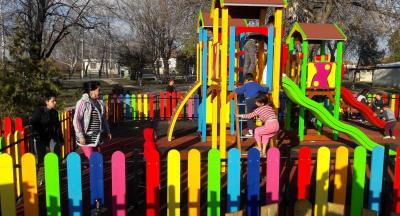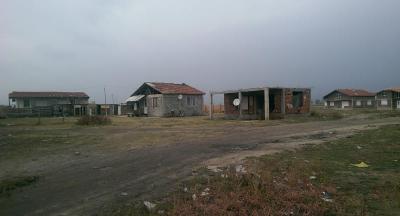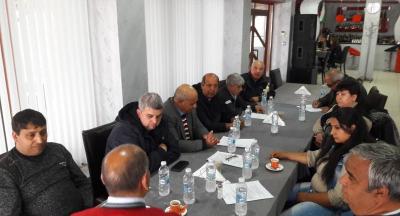Septemvri
*Disclaimer: The information and views set out in this page do not necessarily reflect the official opinion of the Council of Europe and/or the European Commission. Neither the Council of Europe, the European Commission nor any person acting on their behalf may be held responsible for the use which may be made of the information contained therein.
Septemvri is located in South Bulgaria and is part of Pazardzhik administrative district. It comprises of 15 settlements – Septemvri, Boshulya, Dolno varshilo, Gorno varshilo, Karabunar, Kovachevo, Lozen, Semchinovo, Simeonovets, Slavovitsa, Varvara, Vetren, Vetren dol, Vinogradets, Zlokuchene. The town of Septemvri is the administrative center of the municipality.
The Roma population consists 36% of the entire population in the municipality, according to Municipal Action Plan for Roma inclusion 2014-2020. They live in separate neighborhoods and they are concentrated in 5 settlements Septemvri, Vetren, Semchinovo, Kovachevo and Zlokuchene. The mayors of the villages Semchinovo, Kovachevo and Zlokuchene are Roma as well as 4 municipal councillors out of 21.
Some of the main issues Roma are faced with are:
- - Illegal housing;
- - High unemployment rate;
- - Lack of health insurance;
- - Lack of ID and property documents.
One of the consequences of these being the significant number of members of the community migrating to Western Europe.
The ROMACT Process
Septemvri municipality joined the ROMACT program in September 2016. On 28 March 2017, the Municipal Council adopted the updated Municipal Action Plan for Roma Integration (MAPRI) 2017-2020.
The Community Action Group (CAG) was set up shortly after as well as a dedicated Taskforce (see timeline below for details).
The CAG collected and assessed the community needs and prepared a detailed list of priorities for 4 fields:
1. Education:
1.1. Establishment of parents clubs in the schools, organization and implementation of periodical meetings between school teachers and parents.
1.2. Inclusion of young Roma parents within the public councils in the schools and kindergartens.
1.3. Motivation of the Roma parents' interest towards the education of the children through organization of meetings in the Roma mahalas.
1.4. Appointment of educational mediators in the schools with the aim to prevent early drop-out of the Roma children.
2. Health care:
2.1. Training and appointment of health mediators.
2.2. Establishment of center for health-educational campaigns among the Roma community, delivering information for prevention of AIDS. Minimizing the early years pregnancies. Periodical medical check-ups of the Roma who are not health-secured.
2.3. Appointment of personal doctor in Zlokuchene village.
3. Housing:
3.1. Study of the non-regulated territories and defining the ownership of the land in Septemvri, Kovachevo, Zlokuchene, Vetren, Vinogradets, Boshulia, Vetrin dol and Karabunar.
3.2. Active work of the municipal commission on address registration.
3.3. Elaboration of regulation plans.
3.4. Identification of municipal land for housing needs.
3.5 Improvement of the infrastructure in Semchinovo, Zlokuchene, Vetren, Kovachevo and Septemvri through EU programs and national programs.
3.6. Delivering of garbage cans in the Roma mahals.
4. Employment:
4.1. Organization of on-field days of the Labor bureau in Semchinovo, Zlokuchene, Vetren and Kovachevo for registering unemployed Roma.
4.2. Appointment of labor mediator for Zlokuchene, Vetren and Kovachevo.
4.3. Opening of working positions for Roma in the sphere of agriculture.
4.4 Opening of municipal enterprise to employ Roma persons.
4.5. Qualification courses for young Roma.
The update and adoption of the MAPRI 2017-2020 was done based on that list.
So far, the following measures to solve problems in Roma community were taken:
* Creation of a Municipal Commission for registration
* Opening of an on-field work station of the Labor office for 13 villages
* Organisation of support for 100 families in need of legalising procedures for their houses
* Identification of municipal land for housing needs, including mapping and parcelling the land
* Recruitment of health mediators
* Construction of 23 playgrounds
* Cleaning campaigns and set up of concrete trash containers
* Vetren- Set up of a new water supply pipe and a new sewerage pipe (both 300 m. long)
* Semchinovo: Set up of water supply and sewerage (100m )
* Reconstruction of street 52 in Vetren and 33 in Semchinovo
* Distribution of 35 big trash containers and 300 waste bins (120 l) in all Roma neighborhoods
The Municipality benefited of ROMACT expertise for the following projects :
* "Concept of municipality Septemvri for social inclusion of vulnerable groups"- Funded by the OPHRD-OPSESG.
Beneficiaries : 1 300 persons
Budget : 282.000 euros
Status : approved
* "Socio-economic Integration and Measures to Improve Access to Education for vulnerable groups in Septemvri Municipality"- Funded by the OPHRD- OPSESG.
Beneficiaries: 1 015 persons
Budget: 456 120 €
Status: approved
* Creation of a STEM centre in the town of Vetren, National Program “Establishing school STEM environment”, Funded by the Ministry of Education.
Budget : 12 500 euros
Status : approved
* "Future entrepreneurs": poverty reduction and improved inclusion of vulnerable groups - Funded by the USA Embassy in Bulgaria.
Status : rejected
Trainings provided by ROMACT experts :
Community Action Groups (CAG):
* Training support on advocacy, participation and understanding of local governance;
* Addressing drug delivery and use in the Roma neighbourhoods;
* Training on needs assessment;
* Legal frame for addressing discrimination;
* Participation in the local budget process;
* Harmonizing activizm with professionalism;
* Understand and Participate in CLLD strategies;
* Monitoring and evaluation of the implementation of the Municipal Action Plan for Roma Inclusion;
* NGO establishment and management;
* Conflict management in the community. Work in a team of CAG.
Local Authorities (LA):
* Training on project planning and implementation of short and medium term activities;
* Training on approaches for work in and with Roma community;
* Coaching on relevant funding opportunities of announced procedures under OPHRD;
* Coaching on project planning and consultation on the proposed activities in the Municipal Concept for social inclusion;
* Participation in a public consultation of the Recovery and Resilience Plan of Bulgaria;
* Social and Emotional Development and Language Culture through Lego Education (training for teachers).
LA and CAG :
* Consultations with LA and CAG on the establishment of neighbourhood councils.
Taskforce :
* National programs 2021 - 2027 funded by the EU structural and cohesion funds in support of municipal policies for social inclusion;
* Planning activities from the commmunity priority list and integrating them in the Local Development Strategy.
ROMACT Small Grants Scheme :
ROMACT offers small grants scheme to support the efforts of the municipalities and Community Action Groups to respond together to the needs of the most vulnerable and to multiply the good practices across ROMACT municipalities.
Under the scheme of small grants, the following project was supported by ROMACT between April - Jul 2020:
Initiative to counter COVID19 pandemic – Municipality of Septemvri
ROMACT supported the municipality with 2550 €, reaching 200 disadvantaged families within Roma community. The project mainly covered information campaign on COVID19 and provided masks, disinfectant products, informative flyers to raise awareness in Roma community. Essential food supplies were also provided for families with dire financial situation. Local community action group identified the vulnerable families who were adversely impacted by the pandemic and distributed the packages.




